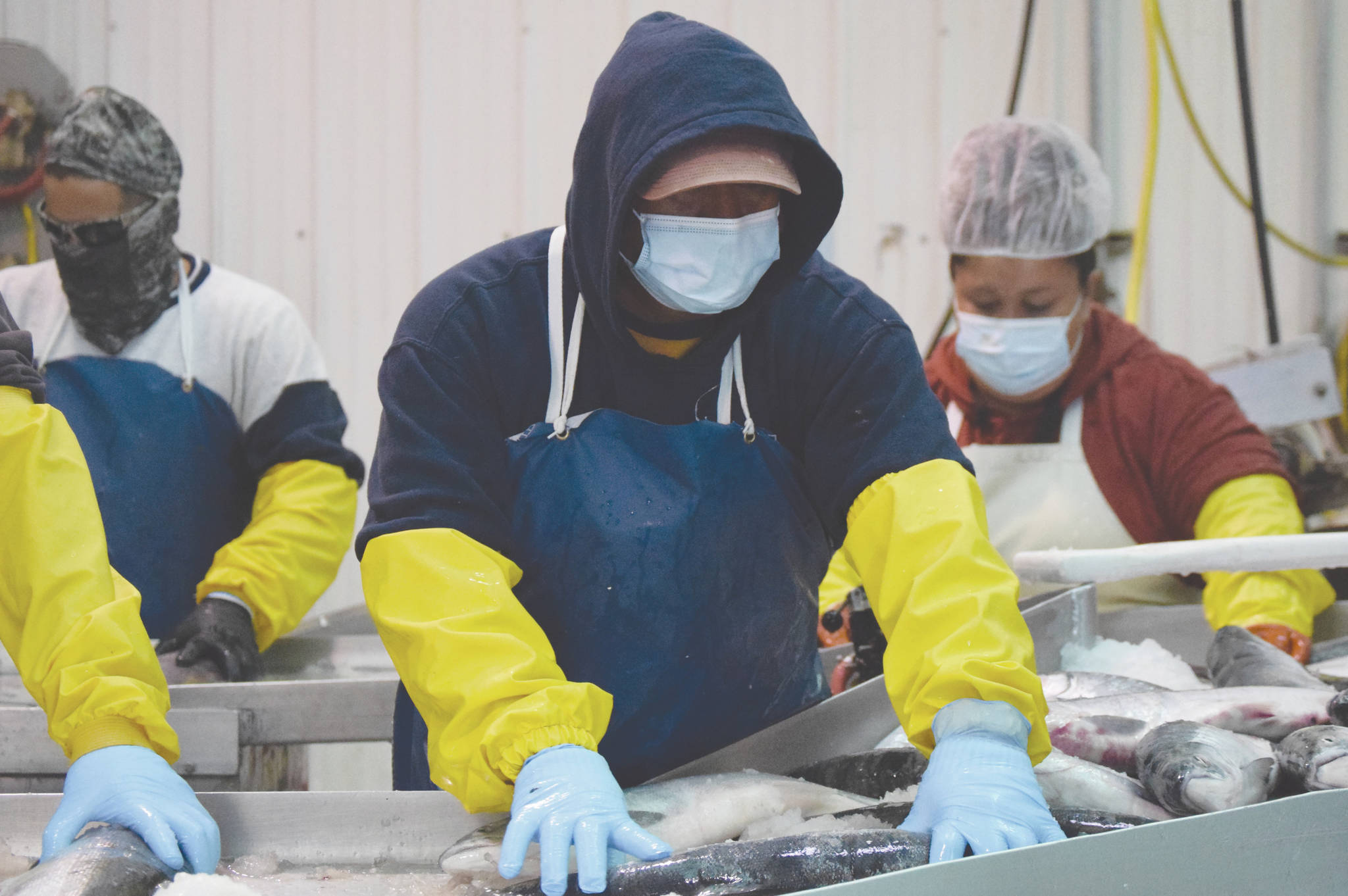The Kenai Peninsula seafood industry is up and running with eight positive COVID-19 cases for out-of-state workers as of Tuesday, according to data from Alaska’s Coronavirus Response Hub.
The state has had 325 positive COVID-19 tests for out-of-state visitors, with 170 of those coming in the seafood industry. The Bristol Bay plus Lake and Peninsula region leads the way with 51 positives, while the Municipality of Anchorage has 33, Valdez-Cordova has 29 and Dillingham has 20.
“So far the Kenai Peninsula hasn’t been put in the crunch of Valdez or Whittier or the Bristol Bay area,” Robert Ruffner, a contractor with the Alaska Salmon Alliance, said. “Here locally, we developed a plan early on and adhered to it.
“We went above and beyond the minimum requirements and, knock on wood, hopefully we can continue to operate that way.”
Ruffner was contracted in April by the Alaska Salmon Alliance — made up primarily of seafood processors on the Kenai Peninsula — to help develop a plan to get the seafood processors operating this summer in the midst of the new coronavirus pandemic. Ruffner said there are three main processors operating this summer on the peninsula.
Working with Alaska Department of Health and Social Services, Alaska Department of Fish and Game, and local governments, Ruffner said seafood processors came up with a plan to keep Kenai Peninsula communities and seafood processing workers safe.
“It has gone extremely well,” Ruffner said. “Unfortunately, we have had a few cases that have showed up because of the process we went through. We have been able to keep them isolated from the community while getting them to recover from the virus.”
Nate Berga, the plant manager for Pacific Star Seafoods in Kenai, gave credit to parent company E&E Foods for taking the threat posed by the new coronavirus seriously from the beginning. Berga said employees, going back to the small group of Alaskans doing processing way back in February, also have bought in.
“If you have family in the community, it definitely motivates you,” Berga said.
Ruffner said COVID-19 mitigation plans have cost the processors well over $100,000.
“They went above and beyond taking care of the community, so they hoped the community could reciprocate by helping out with grant funding,” Ruffner said.
Ruffner said the state and city of Kenai have responded by cutting in seafood processors on the U.S. government’s $2.2 trillion coronavirus relief bill.
Berga said Pacific Star Seafoods is still spending extra money on coronavirus mitigation.
“It’s what it took to continue to support fishermen and buy fish, and keep our employees healthy and happy,” Berga said. “Our parent company believed in it and supported it at all costs.”
Berga said Pacific Star received relief funds from the city of Kenai.
“It was a tenth of what we spent, but it was huge,” he said. “We’re definitely thankful for that support.”
Both Berga and Ruffner said processors went out of their way to do in-state hiring for this season.
That still left a need for hundreds of out-of-state workers. Ruffner said a lot of the expense came from bringing the out-of-state workers up two weeks early for a quarantine. The workers needed to be housed and paid during that time.
The out-of-state workers were tested upon arrival, six days after arrival and 12 days after arrival. Any positive test led to a further quarantine and testing of anybody the positive worker had been around. Ruffner gave credit to DHSS for making so many tests available to the industry.
The initial concern was that out-of-state workers would bring the new coronavirus to peninsula communities that were seeing few cases.
“Now we’re seeing local transmission numbers continue to grow,” Ruffner said. “The thing we’re still pretty concerned about is someone now gets the virus locally and brings it into the plant, where there’s potentially high distribution.”
Ruffner said the processors are now screening and temperature checking employees diligently.
“Everyone is wearing masks in the plant,” Berga said. “Even if you are working 6 feet apart, you don’t know when your job is going to require you to move into a different spot.”
Berga also said intermingling with the community does happen. Of the 190 employees, about 30 live in the community. Other employees are let off-site once every 10 days to handle things like banking.
At the plant, steps have been taken to limit interaction. For example, cafeteria tables are spliced into six areas by plexiglass screens. Berga said social distancing mandates would have required just three at the table if there were no plexiglass.
While the processors are taking steps to keep the virus out of plants, Ruffner said it’s one more reason why Alaskans should be wary of rising case numbers in the general community. He said many of Alaska’s big industries, like oil and gas, mining, commercial fishing and tourism, rely on congregate work environments.
Ruffner also gave credit to commercial fishermen for smoothing the process. In order to sell fish to the processors, commercial fishermen must have an acknowledgment form filled out. This form says the fisherman is complying with Gov. Mike Dunleavy’s Health Mandate 17 and relevant appendixes. The mandate and appendixes give requirements designed to slow the spread of the new coronavirus.
Even with so many independent fishermen, Ruffner said he had not heard of any sales on the peninsula that did not take place because the form wasn’t filled out.
“The processors were successful getting the word out to a lot of independent harvesters on the peninsula,” Ruffner said.

